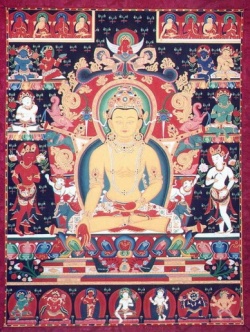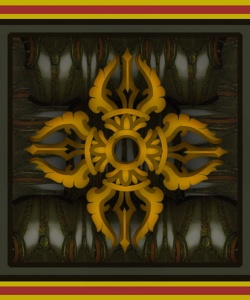The Days of the Week in the West
Before looking at Chinese, Japanese, Vietnamese, and Mongolian name, let's take a brief look at the origins of the week in the West. (This is a very brief summary. The development of the week from its ancient origins is both complex and fascinating. To get a full picture, you need to look at some of the many other sites around.)
Planetary names
The seven-day week is believed to have originated with the ancient Babylonians. The Babylonians arrived at the 'week' by dividing the lunar month into four lots of seven days each. Each day was named after one of the so-called 'seven planets', i.e., the sun, the moon, and the five planets visible to the naked eye. These five planets, modern-day Mars, Mercury, Jupiter, Venus, and Saturn, were named after the Babylonian gods. (An alternative theory from ancient times attributes the planetary names for days of the week to the Egyptians.)
The ancient seven-day week, with days named after the 'seven planets', in turn named after gods, was adopted by the Greeks, who substituted their own planetary names using the names of their own gods. Apart from the sun and the moon, the five planets were named after Ares, Hermes, Zeus, Aphrodite, and Chronos. The ancient Greek names for the days of the week were:
| Sunday | Monday | Tuesday | Wednesday | Thursday | Friday | Saturday | |
| Greek | ἡμέρα Ἡλίου | ἡμέρα Σελήνης | ἡμέρα Ἄρεως | ἡμέρα Ἑρμοῦ | ἡμέρα Διός | ἡμέρα Ἀφροδίτης | ἡμέρα Κρόνου |
| Transliteration | hēméra Hēlíou | hēméra Selḗnēs | hēméra Áreōs | hēméra Hermoũ | hēméra Diós | hēméra Apʰrodítē | hēméra Krónou |
In about the 1st century BC, the Romans also started using the seven-day week. Like the Greeks before them, they named the five planets after their own gods: Mars, Mercury, Jove (Jupiter), Venus, and Saturn. The days of the week in Latin became:
| Sunday | Monday | Tuesday | Wednesday | Thursday | Friday | Saturday | |
| Latin | dies solis | dies lunae | dies Martis | dies Mercurii | dies Jovis | dies Veneris | dies Saturni |
The Germanic peoples continued the tradition by substituting their own gods for the Roman ones according to the conventions of the time, namely Tiu (Tiw), Woden, Thor, and Freyja. Only Saturn was retained from the Roman pantheon.
One big difference here, however, is that the Germanic languages do not name the planets after their gods. The new names effectively broke the link with the planets. The English words Tuesday, Wednesday, Thursday, and Friday, descended from the Germanic names, are purely names of gods and have lost any relationship with the planets Mars, Mercury, Jupiter, and Venus.
Hebrew and Christian names
The other source of day names in some Western European languages (but not English) was the Jewish and Christian calendars. Like many ancient peoples, the Hebrews used a seven-day week, which they possibly got from the Babylonians. The Hebrews did not use planetary names -- named as they were after Babylonian gods -- preferring to designate the days by number. Only the seventh was given a specific name as the 'Sabbath'. The Jewish Sabbath, which corresponded to Saturday, was the day of rest and the last day of the week.
Christianity inherited this Jewish conception of the week. However, while the Sabbath was retained in theory, Christians gradually came to put more emphasis on the day after the Sabbath, which was identified as the 'Lord's Day' in celebration of Christ's resurrection at Easter. Sunday, the first day of the week, became both a day of worship and a day of rest for Christians.
The Christian version of the week was officially adopted by the Roman Emperor Constantine in AD 321. The old Sunday (dies solis) was specified as the 'Lord's Day' (dies Domenica) and identified as the first day of the week (Note 1: Is Monday the first day?[1]). The rest of the week was largely numbered starting from the Sabbath.
The modern Greek names for the days of the reflect this conception of the week:
| Sunday | Monday | Tuesday | Wednesday | Thursday | Friday | Saturday | |
| Greek | Κυριακή | Δευτέρα | Τρίτη | Τετάρτη | Πέμπτη | Παρασκευή | Σάββατο |
| Transliteration | Kyriakī́ | Deytéra | Triti | Tetártī | Pémptī | Paraskeyī́ | Sávvato |
| Rough meaning | 'of the Lord' | 'second' | 'third' | 'fourth' | 'fifth' | 'preparation' | 'Sabbath' |
Modern Western names
In the West, despite attempts by Pope Silvester to impose a system of numbering, the old pagan names persisted. They still form the basis of the modern names in Western European languages, which feature a mixture of Christian and pagan elements.
English and other Germanic languages largely retain the sun, the moon, and the names of the Germanic gods.
Italian, French, and Spanish adopt Judaeo-Christian religious terminology for Saturday (the Sabbath) and Sunday (the Lord's Day), but retain the Roman planetary names for the days of the week.
Only Portuguese has done away with the planetary names by substituting numbered days for the weekdays.
The above is a highly simplified treatment of the origins of the names of the days of the week. For a more complete coverage of this fascinating subject, please refer to the Web Links. Be warned, however, that there is no unanimity of views!
For reference, the days of the week in several Western European languages are given below:
| English | Sunday | Monday | Tuesday | Wednesday | Thursday | Friday | Saturday |
| German | Sonntag | Montag | Dienstag | Mittwoch | Donnerstag | Freitag | Samstag |
| Swedish | söndag | måndag | tisdag | onsdag | torsdag | fredag | lördag |
| French | dimanche | lundi | mardi | mercredi | jeudi | vendredi | samedi |
| Spanish | domingo | lunes | martes | miércoles | jueves | viernes | sábado |
| Italian | domenica | lunedì | martedì | mercoledì | giovedì | venerdì | sabato |
| Portuguese | domingo | segunda-feira | terça-feira | quarta-feira | quinta-feira | sexta-feira | sábado |
Notes: German 'Mittwoch' means 'mid-week'. Swedish 'lördag' means 'washday'.
Footnotes
- ↑ Sunday was traditionally regarded as the first day of the week by both Christians and Jews. Following Jewish tradition, the Bible is quite explicit that God rested on the seventh day of Creation, which formed the basis for the Sabbath, the day of rest.
Even when Constantine made Sunday the Christian day of rest, thus giving it the traditional functions of the Jewish Sabbath, there was no question that Sunday remained the first day of the week. The week introduced by Constantine treated Sunday as Kyriaki 'of the Lord', followed by numbered days from Monday to Thursday ('second' to 'fifth') and specific names for Friday and Saturday. Saturday was Savvato, the Sabbath.
(As to whether Constantine was swayed by his previous worship of the Sun God, or whether he simply ratified a practice that already existed among practising Christians is a point of heated debate among certain modern Christians. It does seem true, however, that Constantine was motivated by a spirit of compromise rather than doctrinal purity. A lot of information about this can be found on the Web).
Notwithstanding Constantine, the custom of treating Monday as the first day of the week appeared quite early. When saints Cyril and Methodius brought Christianity to the Slavs, they took on the Greek tradition of numbering the days, but they numbered them from Monday instead of Sunday.
Thus, Slavic languages treat Monday as the first day, Tuesday as the second, etc. Saturday and Sunday are the only days that are named rather than numbered. Saturday is the Sabbath and Sunday in Russian is the word for "Resurrection". (The foregoing information on Greek and Slavic naming due to John Wilson, personal communication).
In Hungarian, which is a non-Slavic language in a Roman Catholic country, Tuesday appears to come from the word for 'two'. Lithuanian and Latvian, neither of which is Slavic, also name the days with numerals, with Monday coming first.
In more modern times, industrial society has done much to destroy the traditional concept of Sunday as the first day. According to Webster's Ninth New Collegiate Dictionary (1983), the term 'weekend', first recorded in 1878, refers to 'the period between the close of one working or business or school week and the beginning of the next'. This concept firmly places Sunday at the end of the week.
Possibly because of this, the International Standards Organisation has decided that Monday is to be regarded as the first day of the week. Calendars in many European countries, in particular, now follow the ISO decision by starting the week on Monday. Airline timetables also number the days from Monday as 1, Tuesday as 2, Wednesday as 3, etc.
http://www.cjvlang.com/Dow/SunMon.html




